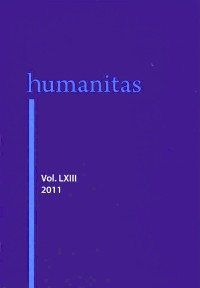Please use this identifier to cite or link to this item:
https://hdl.handle.net/10316.2/23175| DC Field | Value | Language |
|---|---|---|
| dc.contributor.author | Augusto, Maria das Graças de Moraes | - |
| dc.date.accessioned | 2013-04-23T11:40:22Z | |
| dc.date.accessioned | 2020-10-02T10:06:35Z | - |
| dc.date.available | 2013-04-23T11:40:22Z | |
| dc.date.available | 2020-10-02T10:06:35Z | - |
| dc.date.issued | 2011 | - |
| dc.identifier.issn | 2183-1718 | - |
| dc.identifier.uri | https://hdl.handle.net/10316.2/23175 | - |
| dc.description.abstract | Tomando por base as afirmações feitas por J. G. Rosa acerca de Platão e do diálogo Fedro − “Vamos ler Platão. Lá está tudo!” e “O livro mais belo: o ‘Phèdre’ de Platão!” −, nos propomos neste trabalho a realizar uma leitura de Tutaméia, a partir de dois aspecto da prosa dialógica dos diálogos platônicos: o estatuto filosófico do proêmio na composição dos lógoi e o estatuto dos animais na apreensão do conhecimento. | por |
| dc.description.abstract | The aim of this article is based on the affirmations made by J.G. Rosa about Plato and the dialogue Phaedrus − “Let’s read Plato. It’s all there!” and “The most beautiful book: Plato’s ‘Phèdre’!” − to propose a reading of Tutaméia based on two aspects of the Platonic dialogic prose: the philosophical status of the proemium in the composition of the lógoi and the status of animals in the apprehension of knowledge. | eng |
| dc.language.iso | por | - |
| dc.publisher | Faculdade de Letras da Universidade de Coimbra, Instituto de Estudos Clássicos | - |
| dc.subject | João Guimarães Rosa | eng |
| dc.subject | Plato | eng |
| dc.subject | Tutaméia | eng |
| dc.subject | Athena and Heracles | eng |
| dc.subject | Greek Pottery | eng |
| dc.subject | Classical Tradition in Brazil | eng |
| dc.subject | João Guimarães Rosa | por |
| dc.subject | Platão | por |
| dc.subject | Tutaméia | por |
| dc.subject | Atena e Héracles | por |
| dc.subject | Tradição Clássica no Brasil | por |
| dc.title | “Em casa de caranguejo, pele fina é maldição”: Filosofia e Sofística em Tutaméia de João Guimarães Rosa | por |
| uc.publication.collection | Humanitas vol. LXIII | - |
| uc.publication.firstPage | 605 | - |
| uc.publication.lastPage | 636 | - |
| uc.publication.location | Coimbra | - |
| uc.publication.journalTitle | Humanitas | - |
| uc.publication.volume | 63 | por |
| dc.identifier.doi | 10.14195/2183-1718_63_34 | - |
| uc.publication.section | Artigos | - |
| uc.publication.orderno | 34 | - |
| uc.publication.area | Artes e Humanidades | - |
| uc.publication.manifest | https://dl.uc.pt/json/iiif/10316.2/23175/255244/manifest?manifest=/json/iiif/10316.2/23175/255244/manifest | - |
| uc.publication.thumbnail | https://dl.uc.pt/retrieve/11987646 | - |
| item.grantfulltext | open | - |
| item.fulltext | With Fulltext | - |
| Appears in Collections: | HVMANITAS | |
Files in This Item:
| File | Description | Size | Format | |
|---|---|---|---|---|
| humanitas63_artigo34.pdf | 1.91 MB | Adobe PDF |  |
Items in DSpace are protected by copyright, with all rights reserved, unless otherwise indicated.
